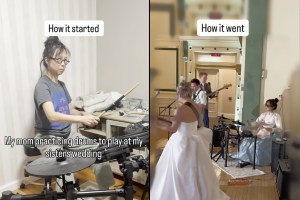Memorial Day marks the day each year when Americans honor the country’s fallen soldiers.
Falling on the last Monday in May, Memorial Day became a federal holiday in 1971. The holiday often is celebrated with parades, picnics, and just some general patriotism. It along with Labor Day serve as unofficial bookends to the “summer season.”
Photo by Win McNamee/Getty Images.
Interestingly enough, the exact origin of the holiday remains a hot topic of debate, with a number of locations around the U.S. taking credit for starting the tradition.
Was it in Waterloo, New York, in 1866 that sparked nationwide celebrations? Or maybe Major Gen. John Logan’s May 30, 1868, observance that kicked things off?
Regardless of who celebrated it first, people have been honoring fallen soldiers in Memorial Day-like traditions for quite some time.
One of the earlier, lesser-known stories involving these types of traditions was that of Charleston, S.C., in 1865.
In the spring of 1865, the Civil War came to an end with the Confederacy’s surrender. In total, somewhere between 618,000 and 850,000 men died over the course of the four-year war.
With the war over, the almost exclusively black population of Charleston began the long process of picking up the pieces of the torn city.
Images by PBS.
Toward the end of the war, Washington Race Course was used as a prisoner-of-war camp for Union soldiers.
More than 200 Union soldiers died while being held at the racecourse, most to disease and exposure. At the time, those men were buried in large mass graves.
The bodies were buried behind the racecourse’s grandstand, and so the men, women, and children of Charleston decided to do what they thought best and most respectful: they offered the bodies a proper burial.
The celebration began with the building and painting of a fence with the words: “Martyrs of the racecourse.”
Yale professor and author David Blight did some of the most in-depth coverage on those April and May 1865 events.
Blight has made the argument that this is the actual first Memorial Day celebration, but as mentioned above, it’s not really known whether or not this is what influenced the first official day.
He described the events like this:
“At nine o’clock in the morning on May 1, the procession to this special cemetery began as three thousand black schoolchildren marched around the racecourse, each with an armload of roses and singing ‘John Brown’s Body.’ The children were followed by three hundred black women representing the Patriotic Association, a group organized to distribute clothing and other goods among the freed people. The women carried baskets of flowers, wreaths, and crosses to the burial ground. The Mutual Aid Society, a benevolent association of black men, next marched in cadence around the track and into the cemetery, followed by large crowds of white and black citizens. … This was their way of saying what the war meant to me and what America means to me. They were now freed men and women.” — David Blight
Does it really matter who started Memorial Day? Maybe not. As Blight has said, “I’m much more interested in the meaning that’s being conveyed in that incredible ritual than who’s first.”
Watch David Blight elaborate on the story of what happened those days in Charleston, S.C. in this PBS clip.


































